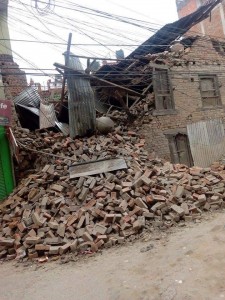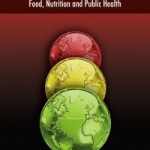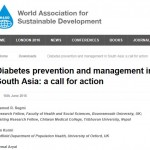 Dr. Pramod Regmi in FHSS published his latest paper today in the South East Asia Journal of Public Health. The paper ‘Priority public health interventions and research agendas in post-earthquake Nepal’ is co-authored with researchers based in New Zealand, Nepal and the UK [1]. The authors reminds the readers that natural disasters cause huge damage to infrastructure, economies as well as population health. Nepal’s 2015 earthquake has multiple effects on population health and health services delivery. Many public health facilities, mostly health posts or sub-healthposts, were damaged or completely destroyed. Priority health services such as immunisation and antenatal care were also seriously affected.
Dr. Pramod Regmi in FHSS published his latest paper today in the South East Asia Journal of Public Health. The paper ‘Priority public health interventions and research agendas in post-earthquake Nepal’ is co-authored with researchers based in New Zealand, Nepal and the UK [1]. The authors reminds the readers that natural disasters cause huge damage to infrastructure, economies as well as population health. Nepal’s 2015 earthquake has multiple effects on population health and health services delivery. Many public health facilities, mostly health posts or sub-healthposts, were damaged or completely destroyed. Priority health services such as immunisation and antenatal care were also seriously affected.
 The earthquake has prompted the need for a disaster-related population-health-research agenda as well as renewed disaster strategy in post-earthquake Nepal. Meanwhile, it also unveiled the gap in knowledge and practice regarding earthquake resilience in Nepal. The paper arues that there is an opportunity for school-based and community-based interventions in both disaster preparedness and resilience. Nepal can build on experiences from other countries as well as from its own. We have discussed possible impacts of the Nepal earthquake on population health and health system infrastructures. We have also suggested possible public health interventions bestowing active awareness among the population and a research agenda in this regard. We strongly urge for the translation of the National Health Policy (2014) into action, as it prioritizes the need of an earthquake resistant infrastructure as well as the implementation of a disaster response plan.
The earthquake has prompted the need for a disaster-related population-health-research agenda as well as renewed disaster strategy in post-earthquake Nepal. Meanwhile, it also unveiled the gap in knowledge and practice regarding earthquake resilience in Nepal. The paper arues that there is an opportunity for school-based and community-based interventions in both disaster preparedness and resilience. Nepal can build on experiences from other countries as well as from its own. We have discussed possible impacts of the Nepal earthquake on population health and health system infrastructures. We have also suggested possible public health interventions bestowing active awareness among the population and a research agenda in this regard. We strongly urge for the translation of the National Health Policy (2014) into action, as it prioritizes the need of an earthquake resistant infrastructure as well as the implementation of a disaster response plan.
Reference:
Regmi, PR, Aryal, N., Pant, PR, van Teijlingen, E., Simkhada, P., Devkota, B. (2015) Priority public health interventions and research agendas in post-earthquake Nepal South East Asia Journal of Public Health 5(2): 7-12 (http://www.banglajol.info/index.php/SEAJPH/article/view/28307/18835 )
 Congratulations new publication Dr. Pramod Regmi in FHSS
Congratulations new publication Dr. Pramod Regmi in FHSS Congratulations to Dr. Pramod Regmi and BU PhD student Folashade Alloh
Congratulations to Dr. Pramod Regmi and BU PhD student Folashade Alloh New collaborative Nepal paper
New collaborative Nepal paper










 REF Code of Practice consultation is open!
REF Code of Practice consultation is open! BU Leads AI-Driven Work Package in EU Horizon SUSHEAS Project
BU Leads AI-Driven Work Package in EU Horizon SUSHEAS Project Evidence Synthesis Centre open at Kathmandu University
Evidence Synthesis Centre open at Kathmandu University Expand Your Impact: Collaboration and Networking Workshops for Researchers
Expand Your Impact: Collaboration and Networking Workshops for Researchers ECR Funding Open Call: Research Culture & Community Grant – Apply now
ECR Funding Open Call: Research Culture & Community Grant – Apply now ECR Funding Open Call: Research Culture & Community Grant – Application Deadline Friday 12 December
ECR Funding Open Call: Research Culture & Community Grant – Application Deadline Friday 12 December MSCA Postdoctoral Fellowships 2025 Call
MSCA Postdoctoral Fellowships 2025 Call ERC Advanced Grant 2025 Webinar
ERC Advanced Grant 2025 Webinar Update on UKRO services
Update on UKRO services European research project exploring use of ‘virtual twins’ to better manage metabolic associated fatty liver disease
European research project exploring use of ‘virtual twins’ to better manage metabolic associated fatty liver disease